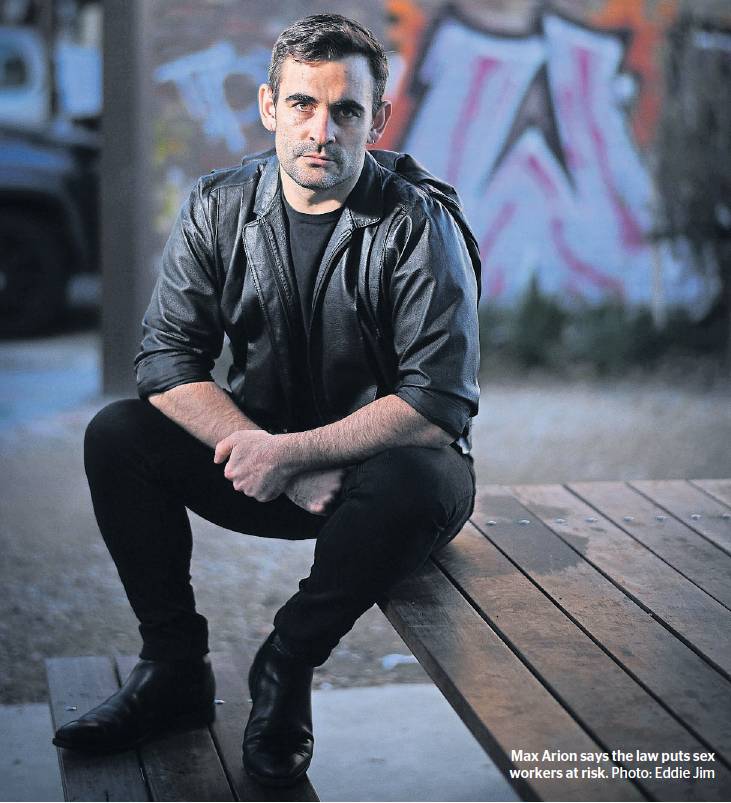Laws on sex work ‘enshrine’ prejudice
Sumeyya Ilanbey
State political reporter
Max Arion says the laws that protect every other Victorian worker discriminate against sex workers such as him and put them in harm’s way.
Mr Arion, a licensed private sex worker, wants the state government to decriminalise the industry, saying it would dispel his fears about reaching out to police.
‘‘I have felt unsafe in terms of ‘what if something happened to me, can I go to the police?’’’ the 35-year-old says.
‘‘And I think that tension isn’t there for a lot of other industries. If you’re worried that the law might be against you, or police might not believe you and you reporting a crime could have larger repercussions for you ... it’s a very tight rope.’’
In Victoria, street-based sex work is a crime but selling sex services at registered brothels, escort agencies, or as a private sex worker is permitted under strict licensing conditions.
However, to obtain a licence, sex workers must register with the government’s Business Licensing Authority, which sex workers say exposes them to discrimination.
The Age on Wednesday revealed the Andrews government was moving to decriminalise sex work in coming months, with cabinet ministers considering legislative reforms that Consumer Affairs Minister Melissa Horne said would protect sex workers.
The decriminalisation push stems from a 2019 parliamentary review of laws governing sex work.
The review recommended a full decriminalisation of the industry, including street-based sex work, and regulating it through the Occupational Health and Safety Act, with WorkSafe taking over from Victoria Police as regulator.
Mr Arion says the Victorian licensing system carries inherent risks for workers. ‘‘There are significant risk factors, or even longterm ramifications of registering as a sex worker on the government register,’’ he says.
The regulations and rules are so complex, sex workers say many are forced to work outside of the law, risking fines and even jail.
Heidi Olsen, a 28-year-old sex worker, has described Victoria’s licensing system as discriminatory, and one that ‘‘enshrines whorephobia’’ in law.
‘‘The decriminalisation of sex work is the model that is best able to uphold human rights of sex workers and to ensure our health and safety,’’ Ms Olsen said.
‘‘The system in Victoria is inherently discriminatory and for me, as a sex worker, it reduces my ability to make choices about my work that are in my best interests.
‘‘So, for example, if I want to work for myself and I don’t want to have anyone telling me how to work, when to work, then I have to out myself to the government and that puts me at risk of who can access that information, will privacy laws be changed retrospectively, can it be accessed via freedom of information.’’
For Ms Olsen, the concept of decriminalisation is very simple: removing all laws and regulations that criminalises any sex work.
This, she says, will be the first step in reducing stigma, giving sex workers more autonomy over their lives, and empowering them to seek justice without fearing prosecution.
‘‘The system makes it hard to reach out when you need help, and there’s the fear that if I go to police, will I just be laughed at because I’m a sex worker ... or mocked and told no one’s going to believe you because you’re a whore.’’
Jules Kim, the chief executive of national peak sex worker organisation of Scarlet Alliance, said the decriminalisation of the industry in NSW, albeit not perfect, has had a positive impact on sex workers, enabling them to better access justice, healthcare and workers’ rights.
‘‘When we’re criminalised, the government is basically stating we’re criminals and we should be treated as such,’’ Ms Kim said.
‘‘When there’s a licensing framework, it again says we need to be treated differently because like somehow we’re not subject to the same rights, responsibilities and protections as other workers in other industries.’’
The Andrews government is likely to release its draft bill by the end of the year, and is expected to gain enough support in the upper house to decriminalise sex work.
The state opposition refused to state its position on decriminalising the industry, but in a statement a spokesman said: ‘‘We would have to see the proposed bill before the made comment or decided on a position’’.
The Australian Adult Entertainment Industry, an association representing the owners of 87 licensed brothels and five licensed escort agencies, is advocating for the decriminalisation of sex work to remove onerous regulations and exorbitant licensing fees that has made the industry so ‘‘business unfriendly’’.
